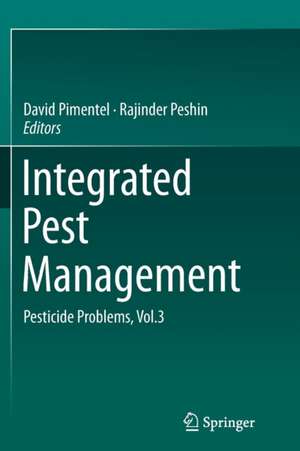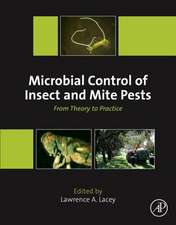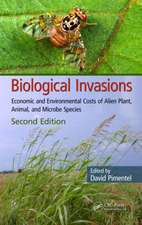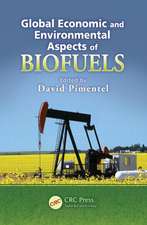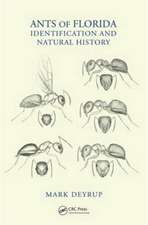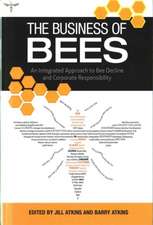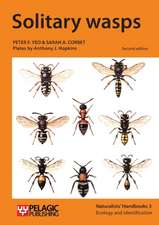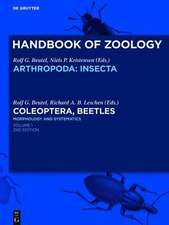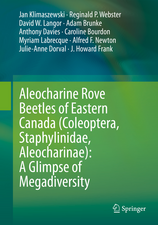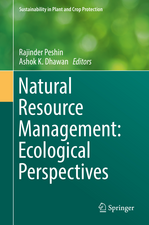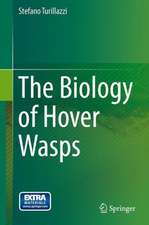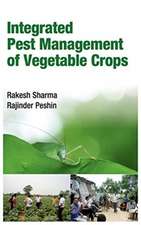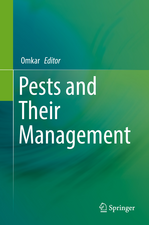Integrated Pest Management: Pesticide Problems, Vol.3
Editat de David Pimentel, Rajinder Peshinen Limba Engleză Paperback – 27 sep 2016
| Toate formatele și edițiile | Preț | Express |
|---|---|---|
| Paperback (2) | 1063.76 lei 38-44 zile | |
| SPRINGER NETHERLANDS – 27 sep 2016 | 1063.76 lei 38-44 zile | |
| SPRINGER NETHERLANDS – 27 sep 2016 | 1226.24 lei 6-8 săpt. | |
| Hardback (2) | 1238.56 lei 6-8 săpt. | |
| SPRINGER NETHERLANDS – 30 apr 2014 | 1238.56 lei 6-8 săpt. | |
| SPRINGER NETHERLANDS – 3 iul 2014 | 1238.86 lei 6-8 săpt. |
Preț: 1226.24 lei
Preț vechi: 1495.42 lei
-18% Nou
Puncte Express: 1839
Preț estimativ în valută:
234.63€ • 244.98$ • 194.19£
234.63€ • 244.98$ • 194.19£
Carte tipărită la comandă
Livrare economică 05-19 aprilie
Preluare comenzi: 021 569.72.76
Specificații
ISBN-13: 9789402400229
ISBN-10: 9402400222
Pagini: 495
Ilustrații: XXI, 474 p. 60 illus., 33 illus. in color.
Dimensiuni: 155 x 235 x 25 mm
Greutate: 0.69 kg
Ediția:Softcover reprint of the original 1st ed. 2014
Editura: SPRINGER NETHERLANDS
Colecția Springer
Locul publicării:Dordrecht, Netherlands
ISBN-10: 9402400222
Pagini: 495
Ilustrații: XXI, 474 p. 60 illus., 33 illus. in color.
Dimensiuni: 155 x 235 x 25 mm
Greutate: 0.69 kg
Ediția:Softcover reprint of the original 1st ed. 2014
Editura: SPRINGER NETHERLANDS
Colecția Springer
Locul publicării:Dordrecht, Netherlands
Cuprins
1. Integrated Pest Management and Pesticide Use.- 2. Environmental and Economic Costs of the Application of Pesticides Primarily in the United States.- 3. Integrated Pest Management for European Agriculture.- 4. Energy inputs in pest control using pesticides in New Zealand..- 5. Environmental and Economic Benefits of Reducing Pesticide Use.- 6. An Environmental, Energetic and Economic Comparison of Organic and Conventional Farming Systems.- 7. Pesticides, Food Safety and Integrated Pest Management.- 8. Crop Losses to Arthropods.- 9. Crop Loss Assessment in India- Past Experiences and Future Strategies.- 10. Review of potato biotic constraints and experiences with integrated pest management interventions.- 11. Biological Control: Perspectives for Maintaining Provisioning Services in the Anthropocene.- 12. Herbicide resistant weeds.- 13. Strategies for Reduced Herbicide Use in Integrated Pest Management.- 14. Herbicide Resistant Crops and Weeds: Implications for Herbicide Use and WeedManagement.- 15. Integrating Research and Extension for Successful Integrated Pest Management.- 16. Promotion of Integrated Pest Management by the Plant Science Industry: Activities and Outcomes.- 17. From the Farmers' Perspective: Pesticide Use and Pest Control.- 18. Evaluation of Integrated Pest Management Interventions: Challenges and Alternatives.
Notă biografică
David Pimentel is a professor of ecology and agricultural sciences at Cornell University, Ithaca, New York, USA. His Ph.D. is from Cornell University. His research spans the fields of energy, ecological and economic aspects of pest control, biological control, biotechnology, sustainable agriculture, land and water conservation, and environmental policy. Pimentel has published over 700 scientific papers and 40 books and has served on many national and government committees including the National Academy of Sciences; President’s Science Advisory Council; U.S Department of Agriculture; U.S. Department of Energy; U.S. Department of Health, Education and Welfare; Office of Technology Assessment of the U.S. Congress; and the U.S. State Department.
Rajinder Peshin is an associate professor at Sher-e-Kashmir University of Agricultural Sciences and Technology of Jammu, India. His Ph.D. is from Punjab Agricultural University, Ludhiana, India. His research expertise is diffusion and evaluation issues associated with sustainable agriculture research and development programs. Peshin has developed an empirical model for predicting the adoptability of agricultural technologies when put to trial at farmers’ fields, and an evaluation methodology for integrated pest management programs. He has published more than 50 scientific papers and chapters of books, and has authored three books. He has also edited two books on integrated pest management, published by Springer in 2009.
Rajinder Peshin is an associate professor at Sher-e-Kashmir University of Agricultural Sciences and Technology of Jammu, India. His Ph.D. is from Punjab Agricultural University, Ludhiana, India. His research expertise is diffusion and evaluation issues associated with sustainable agriculture research and development programs. Peshin has developed an empirical model for predicting the adoptability of agricultural technologies when put to trial at farmers’ fields, and an evaluation methodology for integrated pest management programs. He has published more than 50 scientific papers and chapters of books, and has authored three books. He has also edited two books on integrated pest management, published by Springer in 2009.
Textul de pe ultima copertă
This book, the third in the series on integrated pest management (IPM), deals with pesticide use and the negative consequences of pesticide use in world agriculture. Despite some notable success, IPM implementation and pesticide reduction programs have not achieved the envisioned impact. Low volume pesticides and Bt crops both decreased and stabilized pesticide use in the last two decades, but in the last few years pesticide use has increased, and herbicide resistant transgenic crops are one of the factors propelling it. The book captures the essence of different techniques to reduce pesticide use from the perspective of international authorities from different disciplines and industry. The book will serve the professionals, researcher, academia, governments, industry and students.
David Pimentel is a professor of ecology and agricultural sciences at Cornell University, Ithaca, New York, USA. His Ph.D. is from Cornell University. His research spans the fields of energy,ecological and economic aspects of pest control, biological control, biotechnology, sustainable agriculture, land and water conservation, and environmental policy. Pimentel has published over 700 scientific papers and 40 books and has served on many national and government committees including the National Academy of Sciences; President’s Science Advisory Council; U.S Department of Agriculture; U.S. Department of Energy; U.S. Department of Health, Education and Welfare; Office of Technology Assessment of the U.S. Congress; and the U.S. State Department.
Rajinder Peshin is an associate professor at Sher-e-Kashmir University of Agricultural Sciences and Technology of Jammu, India. His Ph.D. is from Punjab Agricultural University, Ludhiana, India. His research expertise is diffusion and evaluation issues associated with sustainable agriculture research and development programs. Peshin has developed an empirical model for predicting the adoptability of agricultural technologies when put to trial at farmers’ fields, and an evaluation methodology for integrated pest management programs. He has published more than 50 scientific papers and chapters of books, and has authored three books. He has also edited two books on integrated pest management, published by Springer in 2009.
David Pimentel is a professor of ecology and agricultural sciences at Cornell University, Ithaca, New York, USA. His Ph.D. is from Cornell University. His research spans the fields of energy,ecological and economic aspects of pest control, biological control, biotechnology, sustainable agriculture, land and water conservation, and environmental policy. Pimentel has published over 700 scientific papers and 40 books and has served on many national and government committees including the National Academy of Sciences; President’s Science Advisory Council; U.S Department of Agriculture; U.S. Department of Energy; U.S. Department of Health, Education and Welfare; Office of Technology Assessment of the U.S. Congress; and the U.S. State Department.
Rajinder Peshin is an associate professor at Sher-e-Kashmir University of Agricultural Sciences and Technology of Jammu, India. His Ph.D. is from Punjab Agricultural University, Ludhiana, India. His research expertise is diffusion and evaluation issues associated with sustainable agriculture research and development programs. Peshin has developed an empirical model for predicting the adoptability of agricultural technologies when put to trial at farmers’ fields, and an evaluation methodology for integrated pest management programs. He has published more than 50 scientific papers and chapters of books, and has authored three books. He has also edited two books on integrated pest management, published by Springer in 2009.
Caracteristici
Use and benefit of pesticides in agricultural pest control Hazards and problems with the use of pesticides Crop production without the use of pesticides, organic agriculture Includes supplementary material: sn.pub/extras
